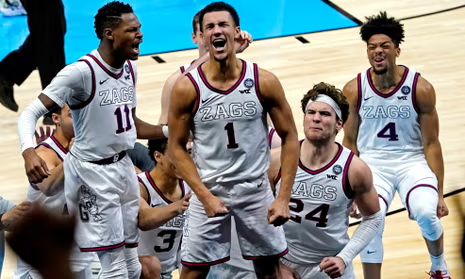Over the past several years, proposals to pay college athletes have gained popularity. A 2021 Morning Consult survey found that 62% of adults believe athletes should be allowed to cash in on the use of their identity in licensed products like jerseys or video games and 61% support allowing student-athletes to make money through endorsements.
On Wednesday, the NCAA announced an interim policy that allows student athletes from all three divisions to monetize their name, image and likeness, often referred to as NIL. The new policy goes into effect Thursday, July 1.
Laws in states such as Alabama, Florida, Georgia, Mississippi, New Mexico and Texas that allow NCAA athletes to monetize their NIL will take effect this year. However, without a federal law, the new NCAA guidance allows students to engage in NIL activities so long as they are “consistent with the law of the state where the school is located” and allows students in states without NIL laws to participate without breaking NCAA rules.
“This is an important day for college athletes since they all are now able to take advantage of name, image and likeness opportunities,” said Mark Emmert, president of the NCAA in a statement. “With the variety of state laws adopted across the country, we will continue to work with Congress to develop a solution that will provide clarity on a national level. The current environment — both legal and legislative — prevents us from providing a more permanent solution and the level of detail student-athletes deserve.”
The NCAA’s announcement specifies that athletes must still follow their state NIL laws and that “colleges and universities are responsible for determining whether those activities are consistent with state law.”
Now, athletes can accept endorsements from brands, monetize their social media presences and work with professional firms that coordinate these kinds of deals for athletes. Some athletes, such as Hanna and Haley Cavinder, twin sisters who play for Fresno State’s basketball team and boast large social media followings, have already accepted sponsorship deals.
Larry Mann, executive vice president of sports marketing agency rEvolution Marketing says the NIL policy shift was “inevitable” given the recent state laws and expects a wide range of athletes to feel significant, but not dramatic, benefits.
“I really don’t see the high profile men’s football, men’s college basketball guys getting rich off this… For instance, a successful football player is going to get 20x in his signing bonus when he goes to the NFL, than what he’s going to get potentially from a sponsorship with a car dealer or whatever,” he says. “But this could be a huge benefit to some of the Olympic athletes, and potentially athletes that don’t get huge exposure.”
He says that for women athletes, who do not have as many professional athletic opportunities after college, the change could make a difference.
Through social media sponsorships or endorsements, some women athletes “could make $10, $20, $30 or $40 grand, to supplement their scholarships — maybe,” he says. “It’s not equality, and it’s not right, but it’s something.”
The news follows a June 21 Supreme Court ruling that NCAA restrictions on “education-related benefits,” such as tutoring or scholarships, for college athletes violate antitrust law.
The unanimous decision means the NCAA cannot bar relatively modest payments to student-athletes and raises questions about the legality of not paying athletes for their participation in sports.
“Traditions alone cannot justify the NCAA’s decision to build a massive money-raising enterprise on the backs of student athletes who are not fairly compensated,” wrote Justice Brett M. Kavanaugh in the concurring opinion. “Nowhere else in America can businesses get away with agreeing not to pay their workers a fair market rate on the theory that their product is defined by not paying their workers a fair market rate. And under ordinary principles of antitrust law, it is not evident why college sports should be any different. The NCAA is not above the law.”
He also noted that “The NCAA’s current broadcast contract for the March Madness basketball tournament is worth $1.1 billion annually” and that Emmert “earns nearly $4 million per year.”
In response to the ruling, the NCAA released the following statement: “While today’s decision preserves the lower court ruling, it also reaffirms the NCAA’s authority to adopt reasonable rules and repeatedly notes that the NCAA remains free to articulate what are and are not truly educational benefits, consistent with the NCAA’s mission to support student-athletes.”


